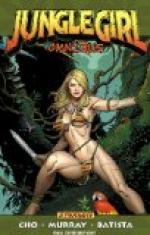At last the tonga rattled into the bare compound of the Basedi dak-bungalow standing on a high stone plinth. The untidy khansamah—the custodian of the rest-home—hurried on to the verandah to greet the unexpected visitor and show his “boy” where to put the sahib’s bedding and baggage in a bleak room with a cane-bottomed wooden bed hung with torn mosquito-curtains.
From a glass case in the sitting-room containing a scanty store of canned provisions the khansamah provided a meal with such ill-assorted ingredients as Somebody’s desiccated soup lukewarm, a tin of sardines and sweet biscuits to eat with them, and a bottle of beer to wash it down with. Wargrave was too choked with dust, too sickened with the heat and glare, to have any appetite. After a smoke he dragged his weary body to bed and in spite of the mosquitoes that flocked joyously through the holes in the gauze curtains to feast on him slept the profound sleep of utter exhaustion.
He was up at daybreak; for the tide served in the early morning and only at its height could the launch approach the shore, which at low water was bordered with the filthy slime of mangrove swamps.
Landed at the other side of the gulf he had even a worse experience of travel before him than on the previous day. For the next stage of the journey was forty miles across a salt desert in a tram drawn by a camel. The car was open on all sides and covered by a cardboard roof; and its wooden seats were uncomfortably hard for long hours of sitting. The heat was appalling. It struck up from the baked ground and seemed to scorch the body through the clothes. The glare from the white sand and even whiter patches of salt was blinding and penetrated through the closed eyelids. A hot wind blew over the hazy, shimmering desert, setting the whirling dust-devils dancing and striking the face like the touch of a heated iron. Wargrave’s small store of ice and mineral water was exhausted, and he felt that he was likely to die of thirst. For in the villages where they changed camels cholera was raging; and he dared not drink the water from their wells.
The tram slid easily along the shining rails that stretched away out of sight over the monotonous plain, the camel loping lazily along, its soft, sprawling feet falling noiselessly on the sand. The last ten miles of the way lay through less sterile country; and the tram passed herds of black buck—the pretty, spiral-horned antelope. Used to its daily passage, the graceful animals, which were protected by the game-laws of the native State through which the line ran, barely troubled to move out of its way. They stood about in hundreds, staring lazily at it, some not ten yards off, the bucks turning their heads away to scratch their sides with the points of their horns or rubbing their noses with dainty hoofs.




